Businessweek 10 24 88 Steve Jobs Can He Do It Again
Reputation
Steve Jobs had the reputation of a hot-tempered manager throughout his life.
As early as 1987, the New York Times wrote: "by the early on 80's, Mr. Jobs was widely hated at Apple tree. Senior management had to endure his temper tantrums. He created resentment among employees past turning some into stars and insulting others, oft reducing them to tears. Mr. Jobs himself would oft cry subsequently fights with boyfriend executives".1
Some xx years later, Michael Wolff's description of Jobs was piffling unlike: "In that location's the mercurialness; the tantrums; the hours-long, dictator-similar speeches; the famous, desperate, and transparent hogging of credit; and always the charismatic-leader circuitous [...], through which he has been able to seduce and, subsequently, carelessness so many of the people he's worked with. He may exist as troubled and unsocialized (and, likewise, as charismatic) a figure in American business life as anyone since Howard Hughes".21 Yet, at the time of his passing, Jobs too had an outstanding 97% approval amid Apple employees according to Glassdoor.22
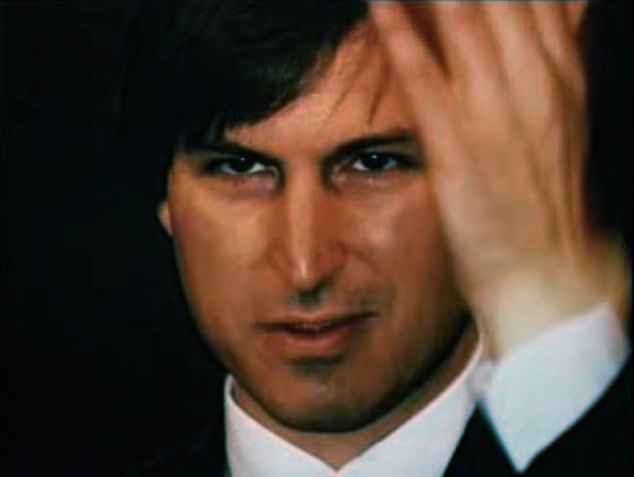
The goal of this article is to explore that aspect of Steve Jobs in greater item, and pigment a broader and more than authentic picture of what kind of manager he was.
What did Steve Jobs do at Apple?
Steve Jobs was non your typical Silicon Valley CEO. Unlike nigh tech companies founders, he had neither any engineering feel nor any business training. After all, he dropped out of higher later on i semester! Few people know that Steve Jobs was never CEO of Apple in his first run there: the visitor was run by older executives and investors, and Steve Jobs actually helped them hire an experienced, 'well-rounded' CEO in 1983, John Sculley. Nevertheless, Jobs was kicked out of Apple by Sculley two years later and he watched him bring the company to naught during his tenure.
The lesson he learned from this painful experience was to trust his own beliefs and values, and completely condone the conventional views on how to run a visitor, including the traditional duties of a CEO. He delegated those duties to members of his executive team, virtually notably his second-in-command and eventual successor, Tim Cook, and focused on what he was best at: creating products, recruiting, marketing, and of course, being the public face of the visitor. He described it in a 2004 interview: "I get to spend my time on the forward-looking stuff. My meridian executives have one-half the other work off my plate. They honey information technology, and I love it."2
Production Design
Steve Jobs had a very hands-on approach to production design, which was arguably the favorite part of his task. He famously often came down to the Industrial (i.due east. hardware) Blueprint lab to spend fourth dimension with the designers team and give his stance and guidance on their prototypes. This was also true of every software UI designer, who would quickly know what her über-boss idea of her work. In fact, production review sessions took up most of Steve Jobs'south workday.
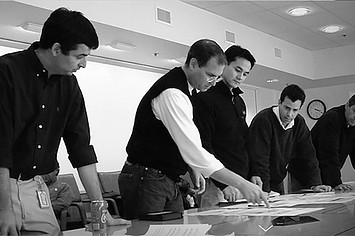
Steve Jobs giving feedback in a production review, 1999
Jobs's reputation as a tech visionary originates not merely from the reliable stream of breakthrough products that have come out of Apple in the terminal decade, but as well from an observation from his closest colleagues. They recount countless times when he took a decision out of the blue, without any rationale, which turned out to be truthful. Ex-Apple tree employee Frederick Van Johnson explained information technology in the book Inside Apple 3: "Because he has that insight. You know, he's Steve. And you're similar, how did [he] fifty-fifty know that? [He's] absolutely right. And it's not even bravado smoke. Normally, he has some sort of weird insight where he just knows." Fifty-fifty Bill Gates acknowledged how impressed he was by that instinctual grasp of technology that Steve Jobs seemed to have.
Jobs himself too knew he was often correct and made himself Apple's ultimate cease user. He often used Henry Ford'southward quote on people wanting a faster horse to justify Apple tree's very deficient use of focus groups — but the truth was that he, the CEO, was the visitor's focus group. He thoroughly tested new products and came back with imperative feedback for the evolution team. If you've ever wondered why some Apple products, such every bit the Numbers spreadsheet program or the Xserve, seemed to stall in evolution, it's because Steve wasn't interested in them. This is really a complaint that some Apple engineers have formulated over the years. Steve had his executive squad focus intensely on 3 to 4 projects over a period of fourth dimension — and if your project was exterior their realm, you were out of luck.
Apple's public image
Steve Jobs had a unique talent for marketing in general, and advertizement in item. Just like his ability to anticipate the consumer's needs and wants, he could estimate which marketing messages would piece of work, and which wouldn't. He best-selling this talent early on, every bit exemplified by the famous '1984' Macintosh advertizement that he insisted Apple ran, despite the board members' rising eyebrows. That commercial is now routinely called the best of the 20th century.
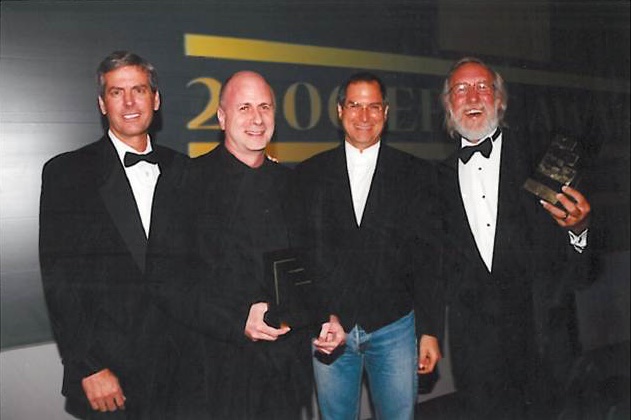
Steve Jobs surrounded by Ken Segall (left) and Lee Clow (right) of the TBWA\MAL advertising agency, at the 2000 Effie Awards, 7 Jun 2000
On his 2nd tenure at Apple tree, Jobs would hold weekly meeting with his top marketing people, and the heads of TBWA's small sectionalization which only handles the Apple tree account, TBWA\MAL. Says Lee Clow, the chairman of MAL and longtime friend of Steve Jobs: "There's not a CEO on the planet who deals with marketing the way Steve does. Every Midweek he approves each new commercial, print ad, and billboard." This is how obsessed with Apple's image he was.
Only information technology did not end with the ads and the marketing copies. Jobs also ofttimes called journalists to give his opinion on their articles on Apple, commonly to complain about bad reviews or even the slightest criticism. Calling people up was actually very Jobsian, and he would also telephone artists personally to get them to play at Apple events or in commercials, as well as competitors or prospective hires.
Recruiting
Hiring was actually one of his most of import roles at Apple tree. He explained his philosophy in the 1980s already: "A players hire A players," he told the Mac team. "B players hire C players. Do y'all get it?" He kept this philosophy that his job was to observe the all-time possible people, to have them rent first-class people too, throughout his life. "My #i job hither at Apple is to make sure that the top 100 people are A+ players. And everything else will take care of itself. If the top 50 people are right, information technology only cascades downwardly throughout the whole arrangement", he told Fourth dimension in 199923. He personally oversaw the hiring of all top executives, and even some talented engineers or designers, calling them up directly to leverage his glory/icon condition. Some famous examples of this are his trying to hire (or learn) the Panic4 and Dropboxfive teams.
Jobs carried through this vision of the 'top 100' people at Apple tree by an annual consequence which he called the 'Meridian 100 retreat'. He took with them the Apple employees he felt were the smartest —not always the highest-ranked, heed yous— and they all left to an undisclosed location where he would share the company'southward strategy for the coming yr and the long term, and then they could all brainstorm nigh it. The Top 100 created something of a caste at Apple: in that location were the 'Top 100' —the chosen ones that Steve would accept with him in the proverbial life raft if he were to start Apple over again— and in that location were the others.
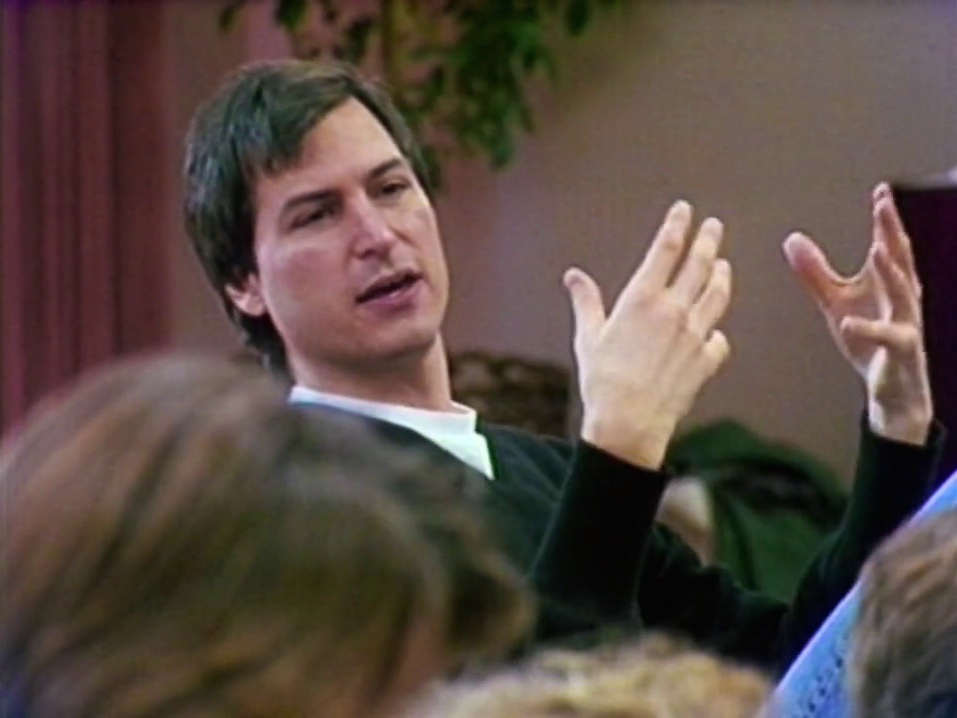
Steve Jobs leading a Next brainstorming session, viii Sep 1986
That vision matter
Of class, it was Steve Jobs who gear up the management for all of Apple, together with his executive squad (nicknamed 'ET'). The ET consisted of the top 10 executives of the company —in his afterward years, this would be COO Tim Cook, SVP of industrial design Jony Ive, SVP of iOS Scott Forstall, SVP of worldwide marketing Phil Schiller, SVP of Retail Ron Johnson, SVP of Internet services Eddy Cue, SVP of Mac hardware Bob Mansfield, and CFO Peter Oppenheimer. They met with Steve every Mon morning time, and reviewed all aspects of Apple tree, discussing every issue and taking decisions. All the ability at Apple tree was essentially full-bodied in these meetings.
Equally Adam Lashinsky put it, Apple is "a command-and-control structure where ideas are shared at the top"24 i.due east. at the Monday executive meeting. All groups would work difficult on presentations for the Mon meeting where they knew the fate of their production was at stake. Steve Jobs was famously open to the executives' arguments and ideas at these meetings. For example, they convinced him (after a long while) to open the iPhone platform with the App Shop... But one time a determination had been taken, there was no give-and-take in the balance of the visitor: they had to execute.
The all-time spokesman in the world
Steve Jobs was famous for his magnetic charisma and incredible showmanship, which he demonstrated at every Apple tree event. Although they seemed unrehearsed, these events were apposite and apposite several times over, and preparing for them was a huge part of Jobs'south job —besides equally many people at Apple. Encounter Steve on Stage for more details.
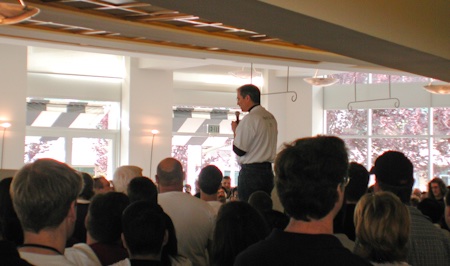
Steve Jobs speaks at Apple tree campus cafeteria on the mean solar day Mac OS X came out, 24 Mar 2001
Summit negotiator
Everybody knows Steve Jobs was a master showman and a production visionary —but few people know he was besides a very harsh businessman. "For about people, he'll become down in history equally the guy who made engineering user-friendly. But to people in business, he'll be remembered as the guy who only did deals where he had all the leverage —and used every scrap of it. It's not plenty that he wins. You have to lose. He'south completely unreasonable", said one executive to Esquire6. His negotiation skills proved crucial to Apple'southward success, including when negotiating with the major music labels before the launch of the iTunes Shop, and with the carriers to gear up for iPhone. Woz speculated he caused those skills with his dad who bought parts on auto dealerships. Information technology's one of the areas where he volition perhaps prove irreplaceable.
A meg other things
Steve Jobs was oftentimes called the ultimate micro-director. Indeed, in addition to the big roles described above, he likewise got involved with all parts of Apple tree —and no detail was too small not to affair to him. Here are iii examples:
- he personally picked the caterer for Apple's deli, Il Fornaio, calling his predecessor's menus 'dogfood'. Later, he made certain that the sushi bar offered "sashimi soba", an original creation of his;
- he once chosen Google executive Vic Gundotra on a Sun morn to change the yellow gradient in the 10-pixel Google logo on the iPhone Map app25
- he personally picked the Italian marble to be used in the NY SoHo Store, and insisted that a sample was sent to Cupertino, and so he could inspect the veining in the stone26
Apple employees have hundreds do examples of such dedication (some call it 'pain in the butt'). Y'all can read some more than on the Anecdotes page.
Steve at Pixar
Steve Jobs was Pixar's main investor for exactly twenty years, minus one week: he incorporated it on February 6, 1986, and sold it to Disney on January 24, 2006. However, his involvement with the company varied greatly throughout his life. Until 1993, he was generally involved with NeXT, equally an early employee recalled: "Steve was never involved in the day-to-mean solar day at Pixar [...]. There were big stretches of fourth dimension, even in Richmond, where we never saw him effectually. (Someone spotted him up there ane solar day driving effectually, trying to recall where our driveway entrance was.) Adjacent and, later, Apple, kept him pretty busy."7 His about hands-on period with Pixar was betwixt 1995 and 1997, between the finishing touches on Toy Story and his comeback to Apple.
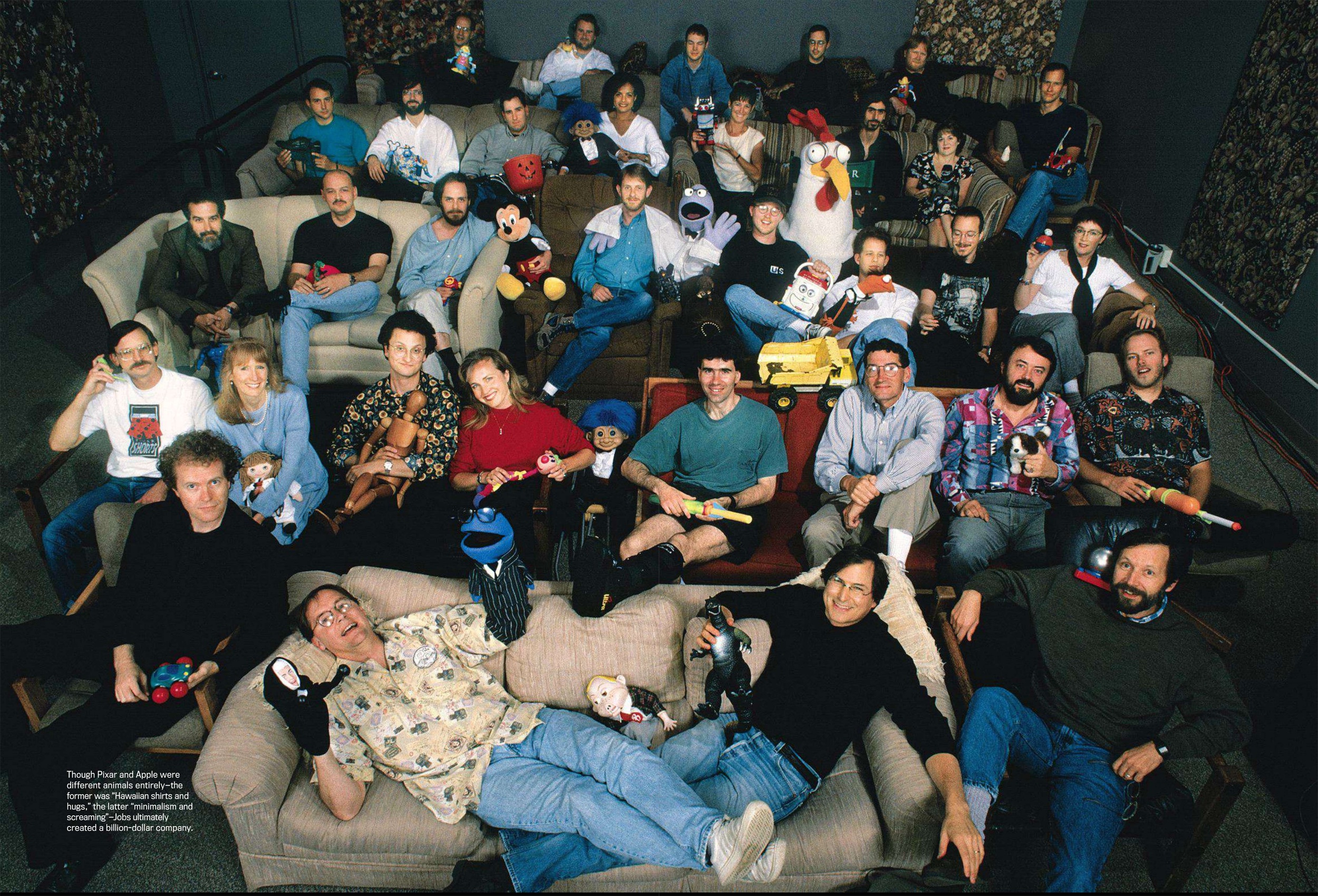
Steve Jobs and the Pixar team, 1995
In 1999, he told Fourth dimension "In that location'south not a day that goes by that I don't do stuff for Pixar, even if I'yard not physically there. And there's not a day that I'm at Pixar that I don't practice stuff for Apple"8, which sums up his involvement with the animation studio quite well. He was mostly involved in major concern decisions, such as the negotiation of deals with Disney or the edifice of the Emeryville campus (although he became obsessed with that campus when it was congenital in 1999-2000). "The Holy Grail for Pixar is releasing one production—a movie-a-yr, and every bit CEO I might make three actually disquisitional decisions a year, and they are very difficult to change", said Jobs in 2003.9
After Pixar was caused by Disney in 2006, he became a prominent board member of the Walt Disney Company, simply that didn't take him nearly every bit much time as being CEO of Pixar.
The civilisation he has created at Apple
System
As explained above, Steve Jobs was told to allow 'more than experienced' managers run the company in his first tenure at Apple —which led to his resignation and the John Sculley debacle. That is non to say that he had no business sense at the time: in his volume about Jobs, Jay Elliot recalls how he used to "dream of the time that Apple could slash its way through to a much simpler management structure, with fewer approval levels, fewer people needing to sign off on every determination. He used to tell me, 'Apple should be the kind of place where everyone tin walk in and share his ideas with the CEO'."20 Although he could never really utilise his large dreams at NeXT, which remained minor, he did so at Apple after his comeback.
The offset priority for Steve when he came back was simplicity: "The organization is make clean and simple to understand, and very accountable. Everything simply got simpler. That'due south been one of my mantras -- focus and simplicity", he said in 1998.ten In other words, the responsibilities of every employee are very clear. For each project, and every task in that project, there will be someone answerable, a so-chosen DRI (straight responsible individual) who volition be congratulated or blamed depending on their task'south success or failure.
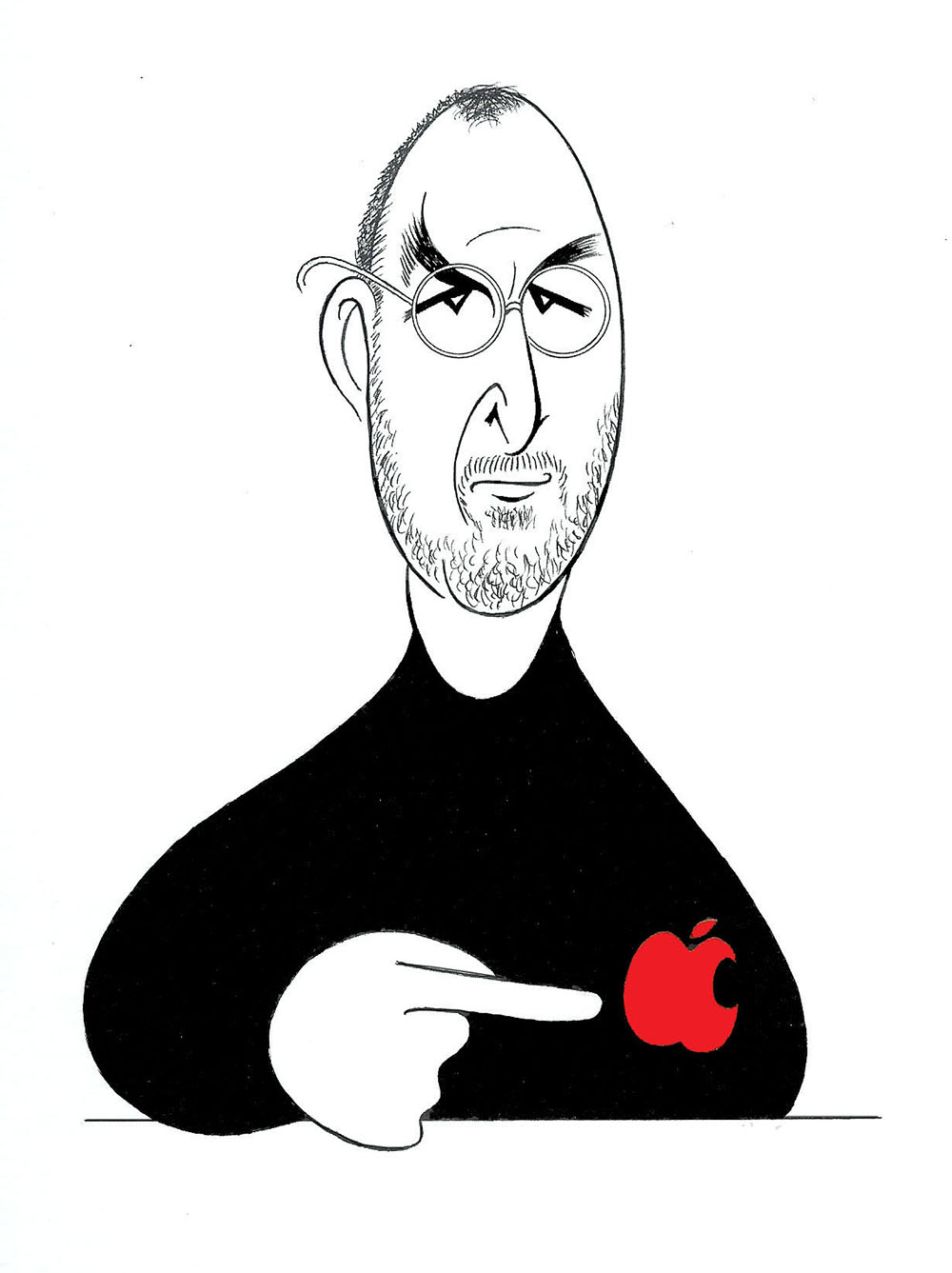
Vladimir llyich Jobs, for The Wall Street Journal
by Ken Fallin
On the executive level, Steve Jobs was very explicit that everyone's job was constantly on the line. In his book Inside Apple, Adam Lashinsky explained Steve'southward parable of "the VP and the janitor": he imagines his trash non being emptied for some time. When he confronts the janitor, he is told that the keys to the locks take been changed and the janitor can't practise his job anymore. So he says to the VP: "When you're the janitor, reasons matter. Somewhere betwixt the janitor and the CEO reasons stop mattering, and that Rubicon is crossed when you become a VP."eleven That is not say that each manager is held accountable on a financial level. On the contrary, the only manager with a 'P&L' (i.eastward. their own turn a profit middle) is the CFO, so every bit not to create fiefdoms: there is ane bottom line at Apple. General managers are even avoided, VPs being generally specialized engineers that take been promoted — with sometimes fiddling to no business grooming.
As for product teams, they have to remain small —for example, there were only two programmers in charge of the original Safari for iPad. The deadlines and the objectives assigned to those teams are in general very precise and in the relative short term. Again, information technology'due south all nearly results and execution: ideas accept been debated and decisions taken by the ET before. As opposed to traditional product management, products don't pass from team to team: they are worked on in parallel, all at once, in some sort of organic process punctuated by cross-squad meetings.
All these business practices: the smaller teams, the lack of fiscal responsibleness for departments, the very uncomplicated hierarchy, the organic development process, even the financial compensation (stock options) were put into place by Steve Jobs to keep a startup mentality at Apple. He even chosen the company "the globe'due south biggest startup" in 2010, proud of the fact that the company kept reinventing itself while its competitors failed to do so. In many ways, his direction philosophy, quite dissimilar from classical business training, was a total success.
Secrecy
Steve Jobs learned how of import secrecy was for a technology visitor during the development of the Macintosh. The product was originally supposed to be out in 1982, and Steve Jobs started talking nearly it around that time — but the release date kept slipping and slipping, until it was finally set up in 1984. By then, Jobs had already leaked near of the revolutionary product's features to the press, and the surprise was much lessened. He learned his lesson when he started Adjacent ii years later. The NeXT Cube was very late, likewise, but no one could tell, because no release date was ever pre-announced; and the media covered the introduction handsomely, since the features of the Cube had remained clandestine.
Jobs has enforced this rule as strictly every bit he could during his second tenure at Apple. The company had become one of the leakiest in Silicon Valley, and he fabricated certain everyone understood this was over when he came back. It is fair to say he instilled a culture of fear to forbid Apple employees to talk about their work, on the outside, only oftentimes also among themselves.
Apple parodied their culture of secrecy by featuring this imaginary facility in their own Goggle box ad for the iPhone 3GS, "Break In", in 2009.
The secrecy from outsiders has obvious motives, such as leaving competitors in the night, not having to apologize for a late product, and of course the huge free publicity that come from both speculation and the sensational release of new products. Every employee knows this is worth millions of dollars, and that a leak would toll them their chore and severe trials. Apple actually distills imitation information to some of its employees to track downwards the source of leaks, and supposedly keeps a special teams dedicated to just that: tracking leaks. It enforces these rules as hard as it can with all their business partners such every bit part suppliers or developers, who were sometimes asked to protect the secret across reason.12
Secrecy was enforced inside the company, too, i.east. most Apple tree employees accept no idea what their colleagues are working on. Apple is "the ultimate need-to-know civilisation", an environment where engineers are only told what they need to know to get their job done. For example, the iPhone had only been seen by virtually xxx people in the visitor before Steve Jobs unveiled information technology in Jan 2007. The rationale is to farther enforce the secrecy to outsiders, but also to avoid politics: "Below a certain level, it is difficult to play politics at Apple, because the average employee doesn't have enough data to get into the game. Like a equus caballus fitted with blinders, the Apple employee charges forwards to the exclusion of all else", writes Adam Lashinsky in Inside Apple.
Strive for perfection
The word 'perfectionist' has become a cliché in the corporate world —but it was not a buzz word for Steve Jobs, who genuinely obsessed over the smallest details. Most employees working on Apple tree products would sooner or later be exposed to his feedback, either directly or through their boss subsequently a Mon executive meeting, and this feedback would commonly come in one of these iii formats: "information technology's bang-up", "it's corking, but change this, this, and that" or, commonly (specially for the first version put forward) "it sucks", "it'southward shit", "this is a D" or some other expletive.
This attitude was ofttimes heralded as proof that Steve Jobs was a 'jerk'. Yet how come Apple employees are so loyal, and the visitor so efficient, with a wiggle at the tiptop? Virtually colleagues of Jobs described him as 'brutally honest' and never willing to settle for anything than the absolute all-time. In other words, nil was ever "proficient enough" —it had to be perfect. Fifty-fifty though Steve Jobs interacted with no more than than nearly 100 employees, this attitude rippled through the whole company —as well by fear. An ex-Apple employee writes: "when Steve was pissed off about something, it got fixed at a pace I've never seen and so or since in my professional life. I judge some people reacted that fast out of fear, but more direct, you would get used to refusing to have annihilation but flawless execution."
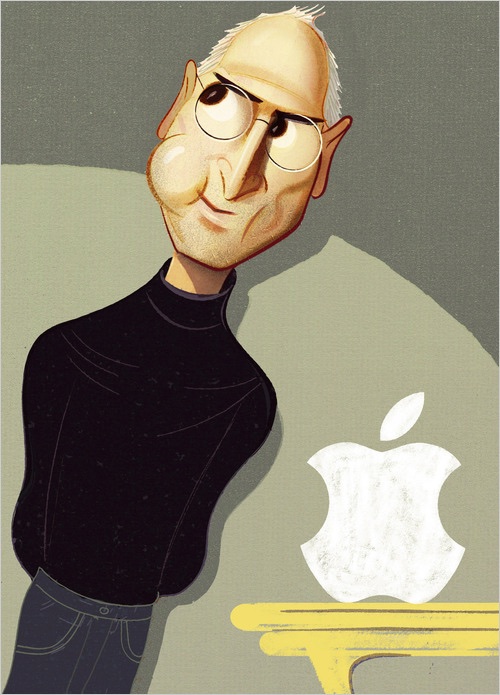
Caricature of Steve Jobs by Eric Palma for The New York Times
Indeed, near employees felt equally if Steve Jobs was always backside them, watching their piece of work and making sure it was up to Apple's standards: "You might go awhile without seeing him. But yous are constantly aware of his presence. You are constantly aware that what you're doing will either please or displease him. I hateful, he might not know who you are. Only there'south no question that he knows what you do. And what you're doing. And whether he likes it or not" said an Apple tree employee. Another said in Within Apple: "Y'all can ask anyone in the visitor what Steve wants and yous'll become an answer, even if 90 percent of them have never met Steve."
Employees working on product evolution at Apple tree were used to other demands of Steve that few companies are familiar with. This included his obsession to saying no more than often than yes when it came to a product design or features i.e. the absolute necessity to focus. They were besides ready to start over a product from scratch when Jobs and the ET felt they were on the wrong track: this happened in 2006 with the original iPhone. And fifty-fifty executives accepted that their teams compete if the cease goal, the product, was going to benefit. For case, Scott Forstall'south Bone Ten squad and Tony Fadell's iPod team both used their best people to develop an operating arrangement for iPhone, considering Jobs hesitated which one to pick. Eventually, iPhone used Bone X, and the iPod people had worked for months for no concrete outcome. But the terminate selection was the best, and such willingness to sacrifice time and coin for a better production was natural at Apple under Jobs.
Steve Jobs'southward real management way
A common refrain heard when talking about Steve Jobs's management style is that Apple employees are so scared of him than they avoid getting into the elevator with him considering they worry to lose their job during the trip. It is likely this must accept happened once, probably in 1997 when Steve Jobs was asking every employee to defend their chore's contribution to the visitor, but it certainly wasn't commonplace.
Information technology is true, notwithstanding, that Jobs was hot tempered, could hands start shouting at his employees and calling their work shit, and reduce them to tears. But he was non just cruel and roughshod: he could also be a total charmer and make his colleagues feel like geniuses (this is how he hired most of them really). While at Adjacent, his employees dubbed this swift change of attitude "Steve'due south hero/shithead roller-coaster", a nice metaphor for the binary view with which Jobs described the world, and how he treated his boyfriend staff. People often wondered why he felt necessary to resort to derogatory remarks and mean insults when he was disappointed with someone'southward (hard) work. His biographer Walter Isaacson asked him, to which he replied "that'due south only who I am". He was indeed very self-aware —he once called Fortune's editor to complain about a slice nigh him, only to say "Wait a minute, you've discovered that I'm an asshole? Why is that news?"
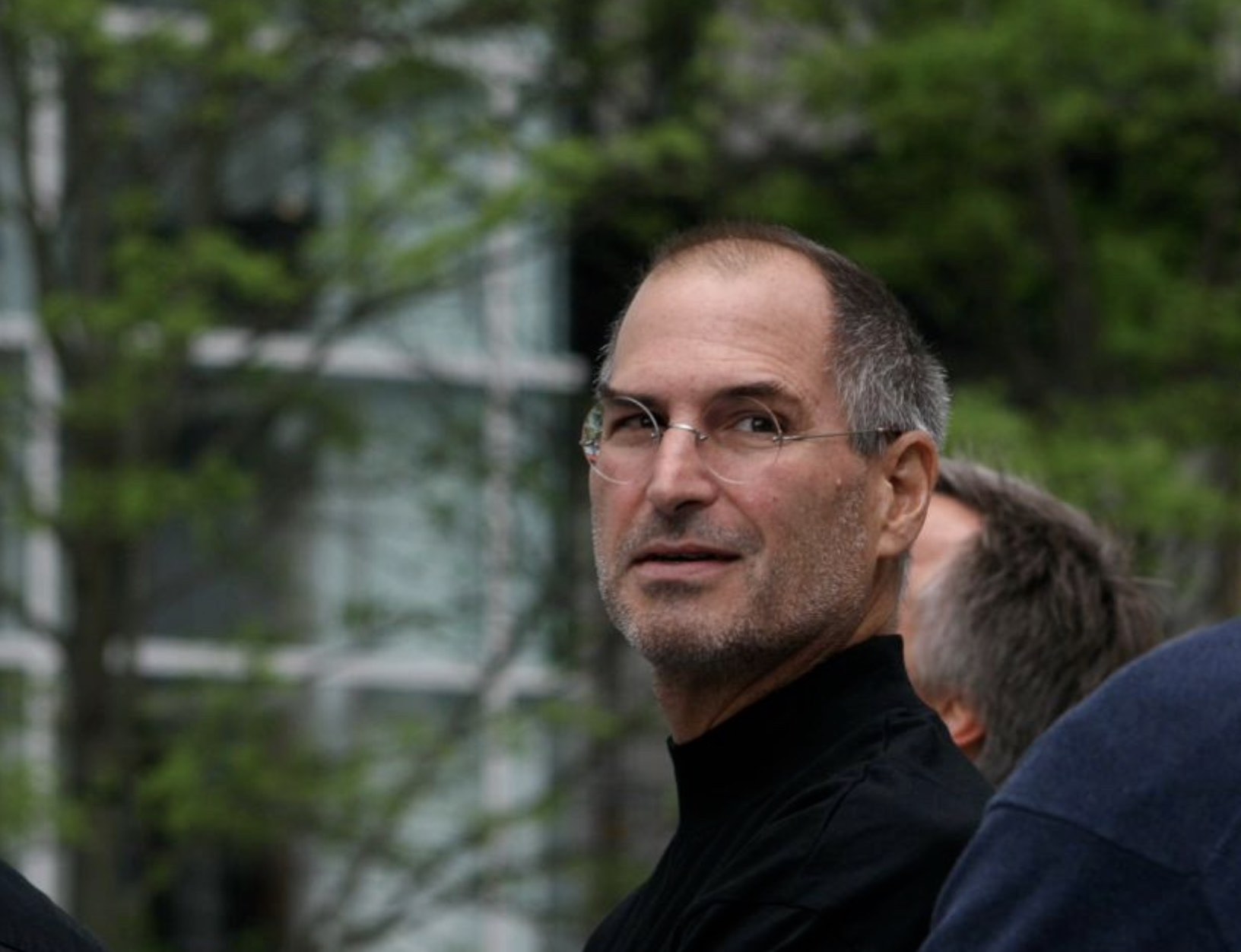
Inspecting the 5th Avenue Apple Store, 2006
Near people who worked closely with Steve have a theory on why he acted this way: it was to extract the all-time of them, make them do the best work they could. And in fact, nearly agreed they achieved feats they did not think they were capable of under his pressure. The psychological machinery at work was that once y'all had been praised past Steve, then insulted, you would piece of work twice harder to earn back his favors. Every bit early on equally the 1980s, the Mac squad members all agreed that without Steve's strong will, at that place probably wouldn't have been a Mac. More recently, Apple tree employee Mike Evangelist wrote: "I was incredibly grateful for the plainly harsh treatment Steve had dished out the first time. He forced me to work harder, and in the end I did a much meliorate task than I would have otherwise. I believe information technology is one of the most important aspects of Steve Jobs's touch on on Apple: he has little or no patience for anything but excellence from himself or others."thirteen
In his dealings with the executive team, though, he seemed more open to arguments — heated arguments, but arguments nonetheless. In fact, he loved to contend, and one of the defining characteristics of his famed 'reality distortion field' was, co-ordinate to Andy Herzfeld, Steve's addiction of "throw[ing] you off balance past suddenly adopting your position as his own, without acknowledging that he always idea differently".14 He wanted to explore every facet of an argument before making his mind. Such arguments were no fun and games, withal: if you stood up against him, yous'd better come up prepared to defend your stance, considering he would non suffer a fool. Mike Evangelist called information technology his "logical flaw detector, his uncanny ability to see thru any BS and to instantly goose egg in on the weak point(s) of whatever argument. [...] He grasps the salient points of any situation faster than anyone I've met, and if y'all can't continue upwards that's non his trouble."xv
Steve Jobs explained the reason for his impossible demands to Steven Levy, equally early as 1983: "We take an environment where excellence is actually expected. What'south really great is to be open when [the work] is not corking. My best contribution is non settling for anything simply really good stuff, in all the details. That'southward my chore — to make sure everything is neat".16 The best clarification probably should exist attributed to Jony Ive, who said in the tribute ceremony that Apple held ii weeks after Steve'southward passing: "information technology cost him most. He cared the nearly. He worried the nigh deeply. He constantly questioned: is this good enough? Is this right? And despite all his successes, all his achievements, he never presumed, he never causeless that nosotros would get there in the end. And when the prototypes failed, it was with great intent, with organized religion, he decided to believe nosotros would eventually make something great. [...] So his I think was a victory for dazzler, for purity, and every bit he would say, for giving a damn."
Steve'southward workday
In the last all-encompassing recorded interview he ever gave, at the D8 conference in 2010, Steve Jobs was asked past Kara Swisher "What practice you do all twenty-four hours?" A naive question information technology seems, but one that many observers ask themselves, given both Steve'south few concern implications compared to a typical CEO, and his absolute dedication to a million things that have cypher do with the job of CEO.
Steve Jobs answered that question several times throughout his career. In 1999, he said to Fourth dimension: "I'yard a good morning person. I like it early in the morning. I wake up half dozen-ish. Virtually x years ago I put in a T1 to my house. I'k actually getting ready to put a 45MB fiber to my house, because I want to find out what that will be like, because everybody's going to have that anytime. Merely I have a pretty sophisticated setup; whether I'thou at Apple or at Pixar or at my home, I log in and my whole world shows up on whatever of those computers. It'due south all kept on a server. So I bear none of it with me, but wherever I am, my complete globe shows up, all my files. Everything. And I have high speed access to all of it. And then my role is at domicile too. And when I'm not in meetings, my work is fundamentally on electronic mail. And then I'll piece of work a little before the kids get up. And then nosotros'll all have a footling food and finish upwardly some homework and meet them off to school. If I'grand lucky I'll stay at home and work for an hour, because I can get a lot done, but oft I'll have to come in. I ordinarily go here about 9. 8 or 9. Having worked about an 60 minutes or half or two at home."17
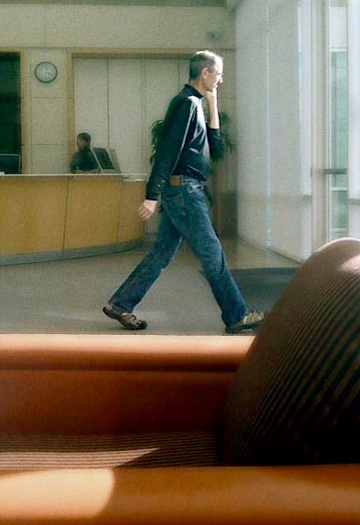
Steve Jobs sight in the Apple tree campus lobby, 2008
A huge part of his job was indeed electronic mail. His could exist sent to Apple tree employees, where it was famous that a message whose subject field was "STEVE REQUEST" would become immediate attending. Simply Steve also read the hundreds of emails he got from diverse customers everyday, sent to his public address sjobs@apple tree.com. He explained it to Time: "All these customers email me all these complaints and questions, which I actually have grown to like. It's like having a thermometer on practically whatever issue. If somebody doesn't affluent a toilet around hither, I get an email from Kansas almost it. Sometimes I can become about 100 or more than of those a 24-hour interval from people I will never meet. Merely I zing 'em around, and information technology'southward good to keep us all in touch on."
He also described his Monday meetings in 2008, to Fortune: "What we do every Monday is we review the whole business organisation. We expect at what we sold the calendar week before. We await at every single product under evolution, products we're having trouble with, products where the demand is larger than we tin can make. All the stuff in development, we review. And we do it every single week. I put out an calendar —80% is the same as it was the last week, and we merely walk down information technology every single week. Nosotros don't have a lot of process at Apple tree, but that's one of the few things nosotros do just to all stay on the same page."18 Although the Monday executive meetings were probably the most important of the week, he as well had long sessions on Wed afternoons with his advertisement agency TBWA\MAL and his elevation marketing people, such as SVP Worldwide Marketing Phil Schiller.
Finally, the Walter Isaacson bio revealed that 1 of his favorite pastimes was to hang out in the Industrial Design'south lab in the afternoon, where Jony Ive and his team of designers worked on prototypes of futurity hardware products: "When Steve comes in, he will sit at one of these tables", said Ive. "If we're working on a new iPhone, for example, he might take hold of a stool and starting time playing with different models and feeling them in his easily, remarking on which ones he likes best. So he will graze by the other tables, just him and me, to encounter where all the other products are heading. He can get a sense of the sweep of the whole company, the iPhone and iPad, the iMac and laptop and everything nosotros're considering. That helps him run across where the visitor is spending its energy and how things connect."19
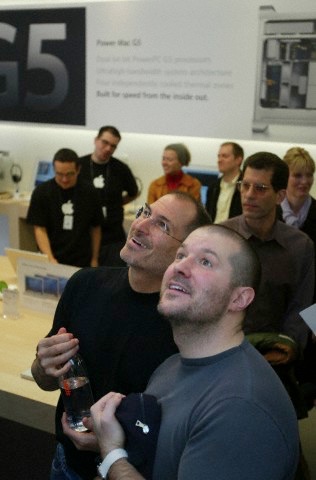
Steve Jobs and Jony Ive, 28 Feb 2004
Jony Ive was Jobs's only soulmate at Apple, probably because of his aesthetic, creative sensibility. Jobs deliberately put Industrial Design on acme of every other sectionalization at Apple, to ensure that the almost beautiful hardware prototypes eventually turned into actual products, without being twisted and deformed by engineers. He explained information technology to Isaacson: "[Jony Ive] understands that Apple is a product company. He's not just a designer. That's why he works direct for me. He has more operational power than anyone else at Apple except me. There's no one who can tell him what to do, or to butt out. That's the way I ready it upwardly."
-
Zen And The Fine art of Computing, John Taylor, The New York Times, 25 Oct 1987 ↩
-
iPod, Therefore I Am, Michael Wolff, Vanity Fair, ane Apr 2006 ↩
-
The Seed of Apple'due south Innovation, Peter Burrows, BusinessWeek, 12 Oct 2004 ↩
-
Inside Apple, Adam Lashinsky, 25 January 2012 ↩
-
The True Story of Audion, Cabel Sasser, 2007 ↩
-
Dropbox: The Inside Story Of Tech's Hottest Startup, Victoria Barret, Forbes, 18 October 2011 ↩
-
Steve Jobs and the Portal to the Invisible, Tom Junod, Esquire, October 2008 ↩
-
Why is Pixar headquartered in Emeryville?, Craig Practiced, Quora, 10 Oct 2011 ↩
-
Apple and Pixar: Steve's Two Jobs, Michael Krant, David S. Jackson, Janice Maloney and Cathy Berth, Time Magazine, 18 Oct 1999 ↩
-
Steve Jobs: Singing a New Melody, Bill Snyder, Insights by Stanford Business organization, 29 May 2003 ↩
-
Steve Jobs: 'In that location's Sanity Returning', Andy Reinhardt, BusinessWeek, 25 May 1998 ↩
-
Inside Apple tree, Adam Lashinsky, 25 Jan 2012 ↩
-
Companies working on iPad software before the production was for sale testified that 'even afterward the formal introduction of the iPad, [they] were required to keep it under padlock and central, with the cardinal turned by Apple tree every night', Developer offers glimpse inside Apple's secrecy efforts, Josh Ong, Apple tree Insider, 9 Sep 2011 ↩
-
The Wizard of Pods – Behind the Curtain with Steve Jobs, Mike Evangelist, Writers Block Live, 5 Feb 2006 ↩
-
Reality Baloney Field, Andy Hertzfeld, Folklore.org, February 1981 ↩
-
Steve Jobs, the Genuine Commodity, Mike Evangelist, Writers Block Live, 7 October 2005 ↩
-
Steve Jobs, 1955 - 2011, Steven Levy, Wired, 5 Oct 2011 ↩
-
Steve Jobs at 44, Michael Krant, Time Magazine, 18 Oct 1999 ↩
-
Steve Jobs speaks out, Betsy Morris, Fortune, 7 Mar 2008 ↩
-
Steve Jobs, Walter Isaacson, 24 November 2011 ↩
-
The Steve Jobs Way: iLeadership for a New Generation, Jay Elliot, 8 Mar 2011 ↩
-
Top 10 Reasons Steve Jobs Will Exist Missed By Apple Employees, Glassdoor Team, Glassdoor, 6 October 2011 ↩
-
Steve Jobs at 44, Michael Krant, Fourth dimension Mag, 18 October 1999 ↩
-
How Apple works: Inside the world'south biggest startup, Adam Lashinsky, Fortune, 25 Aug 2011 ↩
-
Steve Jobs 'ane of the greatest leaders,' says Google'southward Vic Gundotra, Nathan Olivarez-Giles, Fifty.A. Times, 25 Aug 2011 ↩
-
Who Is Jonathan Ive?, Peter Burrows, BusinessWeek, 25 Sep 2006 ↩
Source: https://allaboutstevejobs.com/persona/steve_at_work
0 Response to "Businessweek 10 24 88 Steve Jobs Can He Do It Again"
Post a Comment